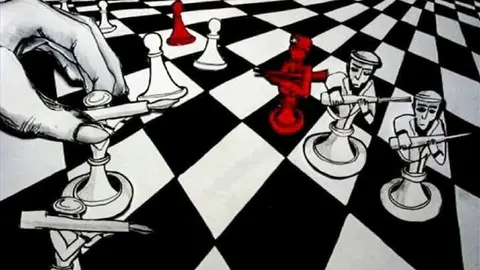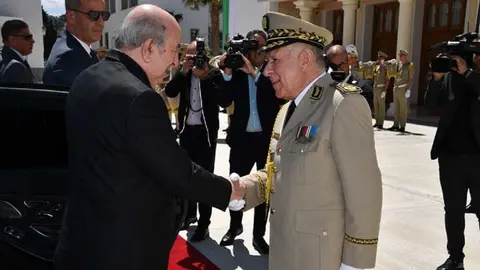On Algeria's "return" to the international stage

According to the draft government action plan presented to the National People's Assembly in February 2020, "Algeria will adopt, under the leadership of the President of the Republic, Abdelmadjid Tebboune, a dynamic and proactive foreign policy that will guarantee it a place worthy of its vocation as a regional power".
This "dignified place" was later explained by the head of state in an interview on Algerian national television on 8 August 2021, confirming that Algeria has been able to regain its "true place" on the regional and world stage, and thus regain the role played by his country "when it spoke on behalf of a third of humanity", just as, adds Tebboune, when "China (People's) joined the UN", or "the apartheid system ended in South Africa" !
Regardless of this delirious glorification of Algeria's past and present diplomatic role, it is legitimate to ask whether the new foreign policy advocated by the Algerian government has been able to guarantee Algeria its rightful place and role in the concert of nations.
First and foremost, this discursive promotion of a 'new foreign policy' for Algeria is taking place in a context of major changes on the international political scene, as well as in Algeria's immediate regional environment, a context that exposes the country to new risks and challenges. The events that shook the Arab world from 2011 onwards led to the fall of established leaders in Tunisia, Egypt and Libya and, as a consequence, the collapse of state structures in Libya and Mali, the two states with which Algeria shares its longest borders after Morocco.
This left the state of "one and a half million martyrs" facing numerous challenges in its immediate surroundings, among which we can highlight the strong tensions with Morocco (1559 km of border) with which it unilaterally broke off relations, the diplomatic crises with Mali (1376 km) with Niger (956 km) and lately with Libya (983 km) which rejected the Maghreb project of Tebboune that excludes Morocco, not to mention a reconciliation with Madrid that remains stalled with the postponement without date of the visit of the Spanish foreign minister, José Manuel Albares, to Algiers after two years of crisis, not to mention the new crisis with Paris provoked by the reception in France of the Algerian opposition leader Amira Bouraoui, and the hysterical political-media campaign recently launched against Abu Dhabi by the junta in power in Algiers, whose only aim is to hide its frustration, its impotence and its isolation.
It seems clear that the changes in this unprecedented context of great uncertainty took the Algerian authorities by surprise. Algeria gave the impression that it is totally incapable of assuming the responsibilities required by the new geopolitical configuration, not only by refusing the outstretched hand of His Majesty King Mohammed VI for a return to normality, but also by rejecting any joint strategy on the Malian question. Algeria, without having the means to achieve its ambitions, sought to remain the key country in regional security affairs, while pursuing an exclusive regional diplomacy, which is considered incomprehensible by many observers and leaders in the region.
It should also be noted that one of the decisive external actions in the context of this "return" to the international stage, and one that has provoked strong tensions between Algeria and some of its traditional partners, was Algerian President Abdelmadjid Tebboune's recent three-day state visit to Russia last June, with the aim of reassuring the Kremlin and strengthening bilateral cooperation between the two countries. Due to the international situation, this visit, widely described as ill-timed, gave rise to serious reservations to the point that 27 members of the US Congress called for Algeria to be punished. Despite US protests, Tebboune delivered a defiant speech and negotiated military and economic deals in a context of international crisis between Moscow and the West.
Making reckless decisions in an increasingly polarised and unpredictable global environment, sidelined at the Arab League summit in Jeddah, ignored by the BRICS he wanted to join, confronted with a loss of influence in the Sahel, isolated on the regional scene, disconnected from international reality, the Algerian military regime that dreams so much of returning to "speaking on behalf of a third of humanity" is today unable to make its voice heard, either within the League of Arab States or among its African and Mediterranean neighbours.
There is no doubt that a political leader who acts with a sense of statehood is the one who takes care to interpret more finely the behaviour of his allies or enemies, to consider perfectly his own national interest, to carefully assess risks and opportunities, and, in this way, to decide more wisely his government's strategies at the international level. But how can we understand the relapsing behaviour of a political actor who, instead of adapting to new geopolitical realities, constantly insists on falling back into his usual bouts of madness; doing everything possible to remain so alone in his environment, so uncertain about his future?
To better understand the successive failures of Algeria's foreign policy during the current president's term in office, it is not enough to measure the pace of the very rapid evolutions taking place in a rapidly changing world, nor would it be enough to take into account the internal economic and political challenges that undoubtedly prevent the country from playing an influential role in its immediate environment and thus implementing its determination to fill the vacuum left by the years of its diplomatic withdrawal.
Perhaps the "constructivist" approach to international relations allows us to understand the complexity of the Algerian case, and to know in particular how the political culture of the generals, the country's true masters, shapes their diplomatic behaviour, since from a constructivist perspective, the elements studied in foreign policy are examined as social constructions. Thus, the notion of national interest, in its constructivist sense, derives from the representation that states have of themselves and others, of the international system and of their own place, as well as that of others, within this international system.
It would therefore be relevant to address the Algerian regime's current representations of the diplomatic role to be played by the country, which was perceived for a time as the "Mecca of revolutionaries" and which today is presented as a "strike force" in Algerian official discourse. Highlighting the role of representational practices and their implications for the conduct of Algiers' foreign policy thus allows us to identify its imaginary of space, security and sovereignty, as well as the preservation of the country's identity vis-à-vis the "enemy". In this sense, the official "anti-colonial" and "anti-imperialist" narrative defines national identity and at the same time serves to designate the "enemy" and legitimise the ongoing mobilisation against this "enemy". Thus, when Algerian power explicitly describes Morocco as an "enemy country", it only shows the importance it attaches to this hostility against the Moroccan kingdom in its construction of identity, while its dull bellicose rhetoric reflects its deep mistrust and strategic short-sightedness.



